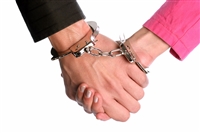Is Your Relationship Unhealthily Codependent?

If you are codependent, you believe that you are less important than your relationship. This leads to unhealthy patterns of behavior, and usually to profound unhappiness. How can you tell if your own relationship is codependent? Ask yourself the questions below and consider what the answers tell you about you and your partner.
Codependent people view and treat their relationship as though it is more important than anything else (especially their own wellbeing). Although it usually comes from a deep sense of devotion and strong feelings of love, it usually combines with low self-esteem to lead to unhappiness and extremely unhealthy behavior patterns. Codependency often starts when one half of a couple is unreliable and self-absorbed. This creates a scenario in which the other half of the couple feels solely responsible for the future of the relationship and will do anything in their power to keep it together. In some cases the codependent partner will not realize that something is wrong. The situation might make them feel smart, strong and organized because they view themselves as a person with the strength and fortitude to hold the relationship together. Others will realize something is wrong, but will continue to stay in the relationship because they don't believe they will ever be able to find anyone else. Codependent people need to step back and realize that instead of trying to prove their strength by controlling the destiny of the relationship, they need to prioritize their own needs.
How can you tell if your own relationship is unhealthy in this way? If you answer 'yes' to most of the following questions, then you may be in a codependent situation.
1) Do you feel that this relationship is more significant than you are?
If you are in love, you should be willing to make sacrifices for your partner and should care about their wellbeing. However, if you feel that you'd be willing to hurt yourself for the sake of the relationship's survival, then this is unhealthy.
2) Do you feel responsible when your partner behaves badly?
If you blame yourself when your partner does something disappointing or hurtful and feel guilty as though you are really the one responsible, you are thinking in an unhelpfully codependent way that will leave you feeling burdened and exhausted.
3) Are you paying too high a price for the reward of being with this person?
A good way to figure this out is to write down all of the things that you are aware of having given up in order to keep the relationship alive. If this list shows you that your own needs are often being ignored, you are probably codependent.
4) Is it difficult for you to express anger or sadness when you feel you have been wronged?
If you find it very difficult to own up to (or discuss) feeling slighted by your partner, this may be because you have a tendency to blame yourself for your negative feelings. Alternatively, it may be because you have grown to expect that your partner will blame you or fail to recognize the legitimacy of your anger or sadness.
5) Do you care more about your partner's success than your own?
While you should support your partner's goals and ambitions, it should not be the case that you do so at the expense of your own. If you find yourself caring more about what your partner achieves than what you achieve, or if you find yourself missing out on opportunities to succeed just so that your partner can, you have developed an unhealthy attitude towards the relationship.
6) Are you the only one who puts energy into improving and sustaining the relationship?
If there is a major imbalance in this respect, it won't be long before you become worn down and miserable. A good relationship requires genuine and consistent effort from both partners.
7) Do you feel anxious and lost any time you are without your partner?
If any and all time apart from your partner leads to you feeling miserable and uncomfortable, you are relying on their presence in your life to a degree that is dangerous to your emotional survival. You need know that you could survive without your partner and that (although they are important to you) they are not the center of the universe.
If considering the above has made you think that you might be in a codependent relationship, this doesn't necessarily mean that your relationship will have to end. If you are both willing to attend counseling in order to learn more about your problems and how to fix them, you may be able to change the unhealthy behavior patterns. However, sometimes it will take a dramatic event to make your partner realize that something is profoundly wrong. You may have to find the courage to stand up and say that if things don't change then you are determined to leave the relationship.
Comments (1)